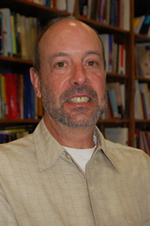
About a dozen students were enrolled in the University of Notre Dame’s interdisciplinary minor “Education, Schooling and Society” (ESS) when it was established seven years ago. Today, the program is one of the largest minors in the College of Arts and Letters.
But more important than the program’s rapid growth is its unique connection to local schools, according to ESS director Stuart Greene, associate professor of English and Arts and Letters associate dean for undergraduate studies.
“Our students’ research is inextricably tied to problems that educators in the South Bend schools are facing,” Greene said.
Designed to help them acquire diverse perspectives on important questions in education, ESS encourages students to view educational issues through the lenses of anthropology, English, history, philosophy, political science, psychology, sociology and theology, thus enabling them to better understand the complexities of education and education reform.
“We work with students on developing research methods and conducting interviews, focus groups, discourse analysis and ethnography,” Greene said. “They do a capstone research project which allows them to see firsthand the effects of issues like poverty and segregation in schools.”
Students have conducted research locally in Perley and Madison Elementary Schools; Brown Intermediate Center; Dickinson Intermediate Fine Arts Academy; Clay, Washington, Adams and Penn High Schools; and at the Robinson Community Learning Center, analyzing many issues, including single-sex classrooms, drop-out rates, mobility, parent involvement, testing and transitions to arts academies.
Many ESS students see the program as a way of acquiring foundational knowledge about education in preparation for applying to Notre Dame’s Alliance for Catholic Education program. ESS also offers resources for students interested in working for non-profits, conducting university research, policy making and pastoral duties.
“The ESS minor allowed me to take a holistic and personal view of the role of education in society,” said Mary Ronan, who recently completed her master’s degree in pastoral ministry at Boston College.
“My senior research project was a case study focusing on one child at South Bend’s Center for the Homeless,” she said. “I wanted to take a deep, realistic and personal look at educational issues for children living in poverty. I discovered not only that the classroom experience plays a major role in providing a sense of stability for these children, but also that a variety of other experiences and individuals such as family, social workers and homeless center staff, become ‘educators’ in their day-to-day lives.”
Notre Dame professor of liberal studies F. Clark Power, who teaches in and helped Greene and former ESS co-director Julie Turner launch the program, says ESS introduces students to the psychological and sociological aspects of education.
“Students take on the perennial issues that have intrigued the greatest intellectuals since Plato,” he said. “How do we acquire knowledge? What should we teach? What are the qualities of a good teacher? Can virtue be taught? ESS students get into local schools and conduct research on educational practices and school climate.”
The win-win relationship helps schoolteachers and administrators develop a better understanding of their students and families and Notre Dame students become more committed to issues of civil rights and social justice.
“It was a great gift to be invited into the child’s life for the semester,” Ronan said. “Her personal story and my findings had a tremendous impact on my desire to educate myself and others to create and be a part of a ‘just’ society. I have not forgotten her.”
Next year, Ronan plans to initiate campus ministry programming at Rocky Mountain College and Montana State University in Billings, Mont.
“I am not a teacher in the traditional sense of the word,” she said. “But I do consider myself an educator through my desire to challenge and encourage students to grow into meaningful members of a society that promotes justice.”